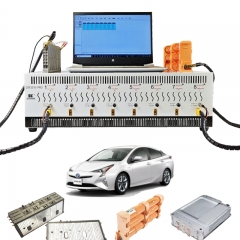By dk-tester | 15 October 2024 | 0 Comments
Unlocking the Power of Data: A Guide to Effective Battery Testing
Battery testing plays a pivotal role in ensuring the longevity, safety, and performance of batteries used in everything from consumer electronics to electric vehicles. For end users, understanding the advanced data analysis capabilities of battery test equipment can be the difference between optimized performance and potential failure. This guide will break down key aspects of data analysis in battery testing and how it can benefit users, with a focus on battery test equipment manufacturers and their cutting-edge solutions.
Table of contents
Advanced Data Collection
Efficient Data Storage and Compression
Data Visualization for Real-Time Monitoring
In-Depth Data Analysis Capabilities
Automated Report Generation
Remote Access and Data Sharing
Data Security and Compliance
Traceability and Custom Reporting

Data analysis is the cornerstone of effective battery testing. By focusing on key features such as data collection, visualization, and report generation, end users can optimize their battery testing processes. Advanced battery testers not only save time but also improve accuracy and safety. To learn more about how cutting-edge battery testers can enhance your testing capabilities, visit DK-Tester for reliable and innovative solutions.
Table of contents
Advanced Data Collection
Efficient Data Storage and Compression
Data Visualization for Real-Time Monitoring
In-Depth Data Analysis Capabilities
Automated Report Generation
Remote Access and Data Sharing
Data Security and Compliance
Traceability and Custom Reporting
Advanced Data Collection
The first step in effective battery testing is data collection. A robust battery tester must be able to gather data on a wide range of parameters simultaneously. Advanced systems offer multi-channel monitoring, which is ideal for testing several batteries under varying conditions. This ability to capture real-time data ensures that no critical performance metrics are missed during testing. For example, some high-end battery test equipment manufacturers include sensors for measuring temperature, internal resistance, and voltage at multiple points during the testing process. The result is a comprehensive dataset that provides a detailed view of battery health and performance.
Efficient Data Storage and Compression
Battery testing generates massive amounts of data, especially during long-term or endurance tests. Without efficient data storage and compression, users risk running out of space or losing critical test information. Modern battery testers often come equipped with cloud storage options, allowing users to store large datasets safely and access them remotely. Another essential feature is data compression, which helps manage storage without sacrificing the quality of the data. For end users, this means more efficient use of resources and the ability to store longer test results without worrying about storage limits.Data Visualization for Real-Time Monitoring
In battery testing, data is only useful if it's easily interpretable. That's why advanced data visualization tools are crucial. The best battery test systems provide dynamic visualizations like graphs and charts, allowing users to track performance metrics in real-time. For example, voltage drop and capacity fade can be clearly illustrated with a customizable user interface, making it easier for engineers to pinpoint issues early in the testing cycle.In-Depth Data Analysis Capabilities
The ability to analyze data is what sets advanced battery testers apart from more basic models. Users need a battery tester that not only collects data but also provides sophisticated analysis tools. Features like charge efficiency calculations, resistance monitoring, and real-time temperature tracking are essential for users who want a detailed understanding of battery behavior.Automated Report Generation
Another key feature of modern battery testers is automated report generation. Automated systems save time by compiling comprehensive reports at the end of each test, allowing users to focus on analysis rather than data entry. These reports can often be exported in multiple formats, including PDF, CSV, or Excel, making them easy to share and review.Remote Access and Data Sharing
Today’s battery testers often include remote access capabilities, which enable users to monitor and control tests from anywhere. Cloud integration allows for seamless data sharing among team members, even across different locations. This is especially useful for large-scale operations where multiple teams may be working on different aspects of battery development.Data Security and Compliance
Data security is a growing concern in battery testing, particularly when dealing with proprietary technologies or sensitive data. Modern battery test equipment manufacturers offer data encryption and access control features to ensure that only authorized personnel can access the data. Additionally, compliance with international standards such as IEC 62133 or UN38.3 is essential for companies working in industries like transportation or healthcare.Traceability and Custom Reporting
For industries that require strict testing protocols, traceability is a must. Battery testers should allow users to log detailed information for each test, including conditions, results, and any anomalies observed. Custom reporting features enable users to meet the specific requirements of their industry, providing reports tailored to various compliance standards.Data analysis is the cornerstone of effective battery testing. By focusing on key features such as data collection, visualization, and report generation, end users can optimize their battery testing processes. Advanced battery testers not only save time but also improve accuracy and safety. To learn more about how cutting-edge battery testers can enhance your testing capabilities, visit DK-Tester for reliable and innovative solutions.
Leave a Reply
Your email address will not be published.Required fields are marked. *
POPULAR BLOG
- Boosting Energy Efficiency in Battery Testing: Strategies for Sustainable Operations
- Top 5 Car Battery Testers of 2024: Unleash Peak Performance
- Advanced Battery Testing: Key to Efficient EV Manufacturing and Market Success
- Empowering Industries: Applications of Li-ion Battery Testing Equipment
- Maximize Your Electric Car's Performance with Our Battery Tester
CATEGORIES